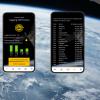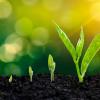
The autumn campaign of the CAMALIOT project is underway! Add the processing power of your Android phone to help collect raw data from the Global Navigation Satellite System (GNSS) to use machine-learning algorithms to improve weather-forecasting systems and win prizes.
The CAMALIOT project aims to build the infrastructure (that is, the hardware and the software algorithms) needed to gather large volumes of observations from GPS-capable receivers of various kinds and quality. Taking advantage of recent developments in mobile technology, IIASA and partners developed the CAMALIOT app to collect and access raw satellite data from cell phones through crowdsourcing, aiming to create better inputs to weather prediction models to, in turn, ultimately increase the accuracy of rainfall forecasts.
In March this year, the project partners launched a four-month campaign encouraging anyone with an Android mobile phone (operating system version 7 and higher) to participate in collecting as much raw GNSS data as possible, from as many locations as possible. The campaign resulted in the collection of almost 120 billion measurements provided by more than 11,800 people around the world. The country that came out on top with contributions to CAMALIOT by the number of devices was Brazil, while Germany took the top spot in terms of contributions by the number of measurements recorded.
The second campaign, which kicked-off on 1 August and will run to 30 November, once again relies on citizens to participate in collecting measurements with their cellphones. Unlike the previous campaign, which had only one prize draw at the end of the campaign, the second campaign will instead have monthly prize draws with leaderboards being reset at the start of each month. The significance is that although the prize draw is random, the more measurements participants collect via the app, the higher the probability that they will win a prize.
“The CAMALIOT app is different from previous crowdsourcing apps in a number of ways. It, for example, collects raw GNSS data in the background, thereby minimizing the amount of active user participation needed,” notes Tobias Sturn, a researcher in the IIASA Novel Data Ecosystems for Sustainability Research Group.
The app can be downloaded from the Google Playstore, or alternatively, users can find the link on the CAMALIOT website.
Once the app has been downloaded, it is just a simple case of installing it and turning on the GPS function on the phone, after which users can start logging the data by simply placing their phone close to a window or somewhere they have a clear signal, like outside. Once the data has been logged, it can be uploaded to the CAMALIOT server using manual or continuous mode. To see their progress, users can check how much data they have uploaded as well as their place on the monthly leaderboards on the dashboard provided.
“The raw data we are collecting through the CAMALIOT app will be tremendously valuable, not only in terms of helping to improve weather forecasting and the general understanding of weather phenomena, but also to investigate other new scientific opportunities that could benefit society (e.g., geodesy, navigation and more). We are very grateful to everyone that has already added the processing power of their cellphones in the first CAMALIOT campaign and we hope that we will be able to build on the success we have had so far over the next four months,” concludes IIASA researcher Linda See, who leads the project at IIASA.
Further information:
Learn more about CAMALIOT and how you can participate on the dedicated website: www.camaliot.org
News

14 May 2024
Study confirms giant store of global soil carbon and highlights its dynamic nature

13 May 2024
Analyzing the underlying causes of the food crisis in Gaza

02 April 2024


